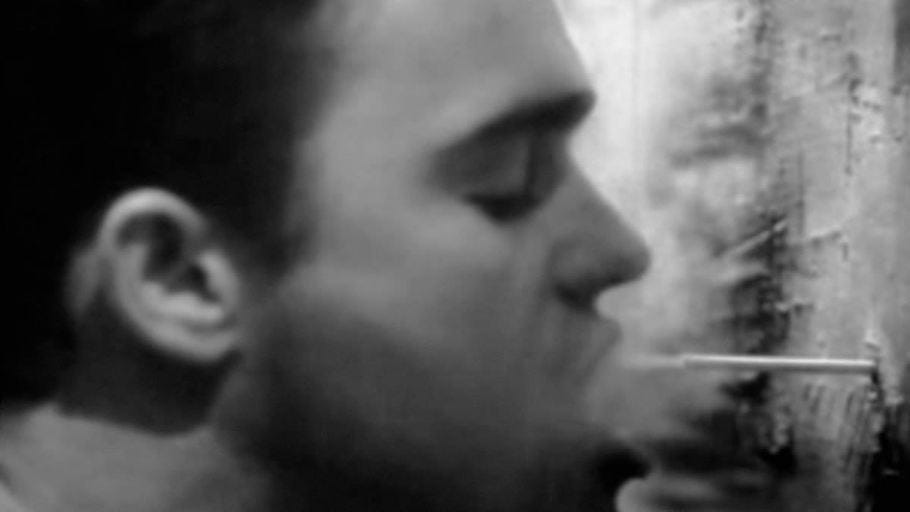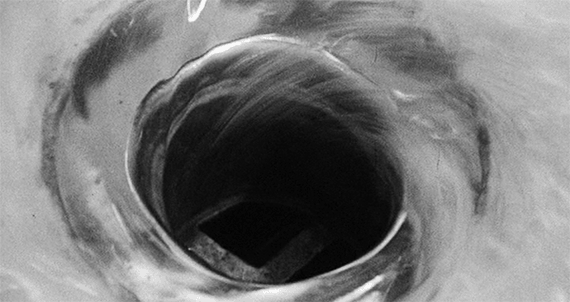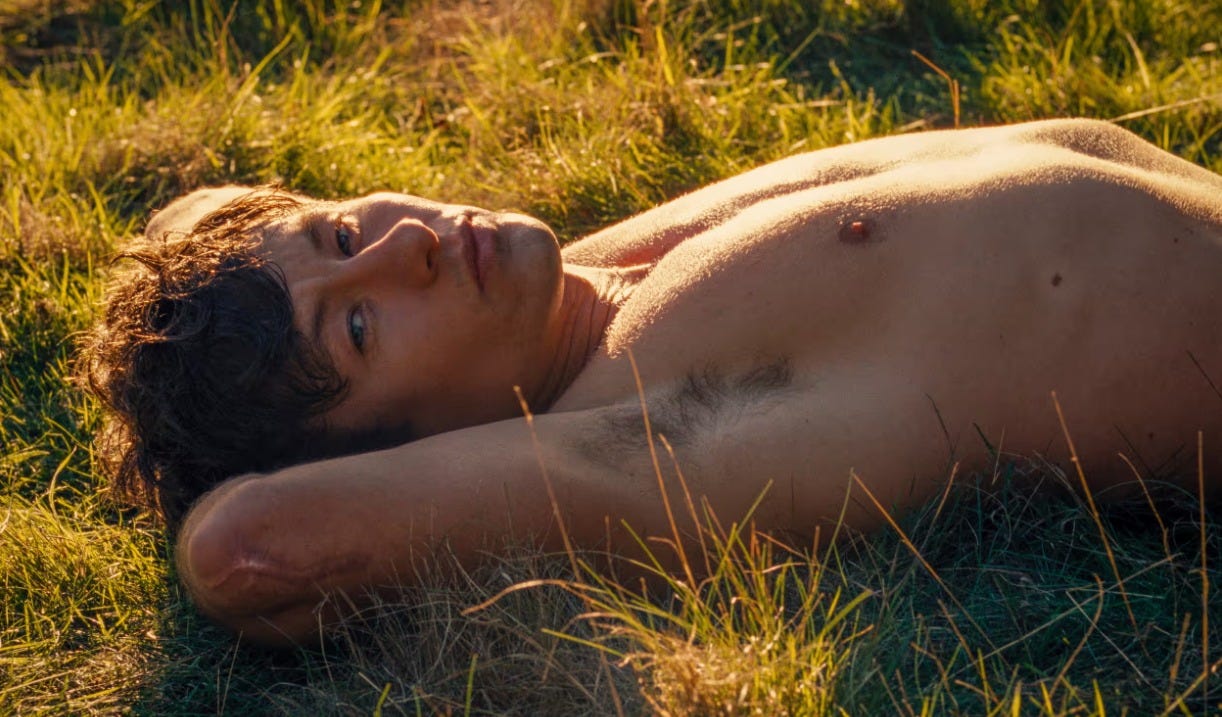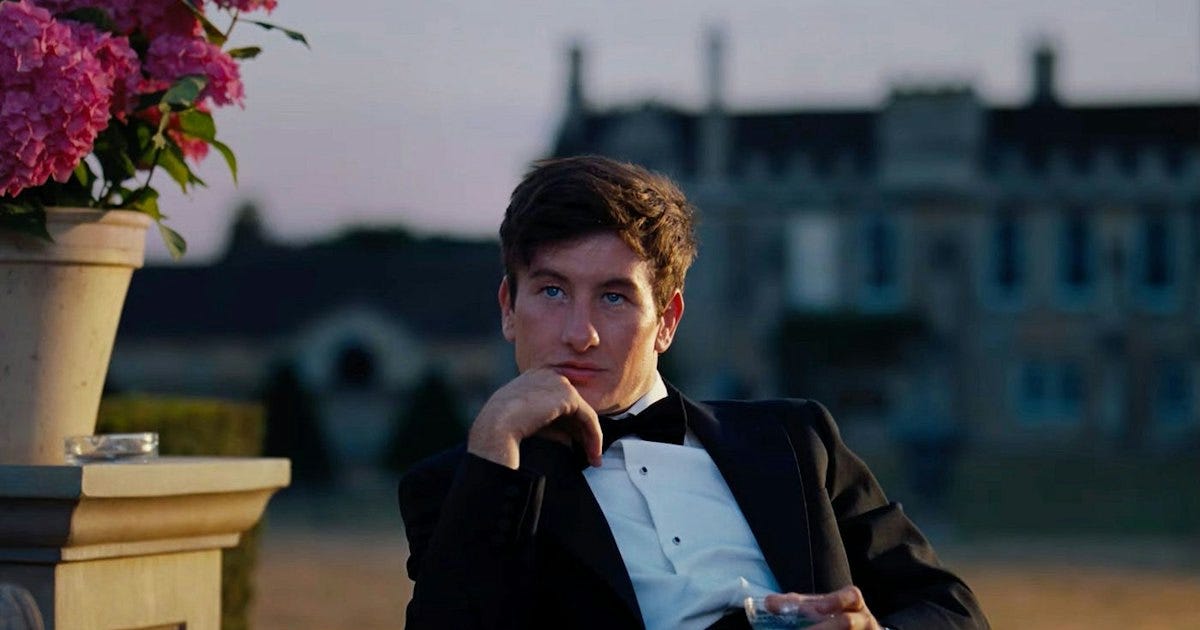Not many films manage to reinvent sex, or even just find fresh, powerful ways of representing it, especially in our jaded, online, perma-gaped age.
(Or is that just me?)
And if you’d told me last year that it would be a British film – one set moreover in a Downton-esque country pile – that would achieve these things in 2024, I would have laughed in your face.
Until I saw Saltburn.
Officially a black comedy and gothic psychological thriller, Saltburn, written and directed by Emerald Fennell, is a really a Satanic satire on everything: sex, love, identity, status, social media, movies, class, even death. But most particularly, the viewer’s self-regard. Saltburn plays several devilish tricks on the audience that are as ambitious as they are hilarious and perverse.
This is most obvious in the passionate online response to the now infamous bath scene. Social media is full of people sharing their shock and disgust at it, some even sharing clips of themselves looking shell-shocked, averting their eyes from the on-screen unspeakableness.
I can’t remember the last time a film provoked this kind of reaction. You’d probably have to go back to the age of Mary Whitehouse, a 1970s English housewife who spent her evenings watching ‘filth’ on TV so that she could complain about it - someone who lots of liberal people seem to be channelling, if ironically.
So, what does the incredibly shocking and disgusting nature of the bath scene consist in? What new, degraded frontier of explicitness and deviance does it explore?
Well, none, really. At least in terms of what appears on screen. No cocks, or even arses, or much flesh at all. And there is zero physical contact. It is all impeccably socially distanced.
An attractive young commoner ‘Ollie’ (played by Barry Keoghan) spies intently, through a crack in the door, on his attractive young aristo Oxford chum ‘Felix’ (Jacob Elordi), who is having a wank in the bath. Becoming aroused himself, we see the blue-blood bather from Ollie’s POV: zooming in on his muscular neck, pretty face, strong chin, posh lips.
Later, alone in the bathroom, the voyeur climbs into the bath, in his PJ bottoms and vest, kneeling in the last remaining inch of draining bathwater, and bowing his head to rim the plughole, noisily slurping the swirling water in sweaty, subby, total devotion.
And, let’s face it, we’ve all been there.
I’m only slightly joking, because I think the visceral nature of the reaction to this scene is precisely down to that self-recognition. The scene is disturbing because it is so erotic – uncanny, and ‘weird’, but disturbing because familiar. And the insulting realisation that comes with it: what is sex if it isn’t slurping someone’s bathwater?
The plughole-rimming scene is sex stripped of consoling cliches and decencies, hence it's... shocking and disgusting. An incredible achievement given our general decadence.
What is sex if it isn’t slurping someone’s bathwater?
By contrast, I’ve seen no outrage or disgust over another provocative scene in Saltburn (which has several powerful scenes, any one of which most other films would die for) in which Ollie performs oral sex on Felix’s sister, Venetia (Alison Oliver). In the garden. While she is menstruating. He plays with her menstrual flow, eats it, feeds it to her on his fingers and they share a bloody kiss.
But somehow Ollie slurping a bit of scented dirty bathwater which might have a few molecules of aristo jizz in it is OMIGOD!! EWW!! GROSS!!!
The plughole rimming scene reminded me of two classics. One is Un Chant D’amour (1950) written and directed by the French poet, novelist and thief Jean Genet. Someone who I think would have loved Saltburn.
Un Chant d’Amour is an early piece of lyrical gay porn, about longing, desire, and separation. But without, as I recall, any actual sexual contact, and only the briefest glimpses of penis. In it, a prison guard peeps on partly dressed young men masturbating in their cells, playing with his own packet. But the most powerful and erotic scene consists in one prisoner blowing smoke through a straw pushed through a small hole in the wall, cascading into the open mouth of the young prisoner on the other side.
If it was streamed on Amazon Prime Video in UHD back in 1950, Genet’s version of plughole-rimming would have caused almost as much disgust as Saltburn’s plughole scene.
Cleverly, Ollie and Felix are never allowed to consummate their love affair in Saltburn. At least not when they are both alive. It really isn’t that kind of film. It’s much more ambitious, erotic, and darker than that.
One of the many Satanic deceptions Saltburn springs is that you initially think/worry that this is going to be some kind of cringe gay love affair story, between the shy, downtrodden little scholarship boy from a rough background in Liverpool, and the tall, absurdly beautiful, madly popular heir to the spectacular Saltburn estate. Will love and kitsch overcome class?
The bath scene is first that explicitly avows Ollie’s desire for Felix, but also the first that sows some doubts about Ollie and exactly what kind of love story this is. There is an unsettling aspect to it that isn’t entirely down to its kinkiness or ‘dirtiness’, partly conveyed by the ominous music, the darkness that surrounds the bath, and Barry Keoghan’s scary, obsessive, hunger. Masterfully, you don’t realise until towards the end of the film, the full, grave, ‘Psycho’ significance of the swirling plughole - the other classic that scene reminded me of.
Likewise, that menstrual oral sex scene with Venetia, where he brushes off her mention that it’s ‘not the right time of month’ with what you thought or hoped at the time was a joke: “Lucky for you I’m a vampire”.
Nice shy awkward Ollie, like the peeping Norman Bates, is in fact a predator – devouring the Catton family one by one, like a vampire. Or a Minotaur: a studly statue of which is at the centre of the maze in the gardens of Saltburn. Which is why bitchy Farleigh, the arrogant adopted family pet, who recognises the upstart moving in on his patch, is no match for Ollie – he’s just a parasite.
The biggest and naughtiest trick Saltburn plays on you though is the way that it deploys Ollie to seduce you. You like/pity him and are so distracted by the comical monstrosity of the people around him, that, as in real life, you try to blot out the information that is whispering this one’s a wrong un.
The scene where Felix springs a surprise visit to his parents on Ollie is so awks I could barely watch. His father is supposed to be dead and his mother a derelict druggie, but they turn out to be both alive and well and upper middle class living on a well-to-do area in a naff new build mock-Georgian home. (A suburban pastiche of a country house.)
I felt so embarrassed for Ollie – even though ‘poor Ollie’ was in fact being outed as a homme fatale, spinning a web of lies around Felix and his family, exploiting their condescending, voyeuristic hunger for ‘real life’. (If Ollie is a vampire, so are his victims.)
Likewise, I felt so sad for him on his last night in Saltburn, spurned by Felix, enduring a fancy dress birthday party held in his honour that had in fact nothing to do with him. Even though there were plenty of clues, from the horns on his head to his eyes on the spit-roast pig, that he was Bad News.
Ollie’s/Keoghan’s mesmerising, oddly impassive blue eyes are at the unnerving centre of Saltburn. “Oh what beautiful eyes! Oh, how wonderful!” exclaims Felix’s mother, Elspeth when she’s introduced to Ollie. (Elspeth is played by the equally charismatic Rosamund Pike, someone I watched two entire seasons of fantasy tosh Wheel of Time for.)
She’s relieved, because ‘I have a complete and utter horror of ugliness. Ever since I was very young. I don't know why.”
Of course, Ollie’s “beautiful eyes” are the very thing that she should be worried about. They suck you in. Hypnotic whirlpools/plugholes you get lost in – like the garden maze.
But Elspeth is as shallow and easily seduced as we the audience are. Movies also have a complete and utter horror of ugliness. Saltburn’s wicked seduction wouldn’t be possible without Keoghan’s chimeric beauty – his face looks different in every shot – and his astonishingly assured, transformative performance.
Keoghan’s smooth, muscular body is also used to seduce you. Slutty Venetia (deceptively used in publicity for the movie) doesn’t stand a chance. Ollie (and to a lesser extent Felix) is the sex object of the film, but one that sneaks up on you. At the beginning, you feel pity for him as a dumpy, unpopular scholarship nerd in glasses at a college full of toffs and snobs. But by the time he gets to Saltburn, for the sweltering summer, he has begun to emerge from his Oxford chrysalis as a beautiful, pumped butterfly.
With a big dick.
We know he has a big dick because of Farleigh’s reaction when Ollie takes his trunks off to join Farleigh, Venetia, and Felix sunbathing nude: “Well, well, well… Good for you.” Then remarking to Felix, in words that turn out to be a mocking premonition, “What a twist.” Ollie is shot from behind, so we don’t see the big scouse schlong. But it registers.
It isn’t until the final, sulphurous-seductive scene, after he has rubbed our noses in his crimes and his sociopathy, when Ollie dances naked around Saltburn, now all his – along with the souls of the Catton family – that we are permitted see his dick, swinging around in time to Sophie Ellis Bextor’s ‘Murder on the Dancefloor’.
And it isn’t disappointing, even though Saltburn must be terribly damp and draughty. The secret predator was indeed packing a serious-sized weapon.
In that final scene, Ollie is dancing around in our heads as much as he is Saltburn. We’ve been had, too. And we are still in thrall, because we can’t stop looking at those "beautiful eyes" and that beautiful arse pirouetting around that beautiful house with its beautiful furniture and beautiful grounds – and checking out that beautiful cock – tapping our foot to the catchy old disco track, and realising, too late, that Ollie is us, but without our timidity. Which, unlike Ollie’s, is real.
Saltburn is pitched somewhere between laughter and shudder – the same place you find orgasms. If you’re lucky.
It is also set in 2007. Before smartphones and social media. Partly because social media destroys everything, especially cinema, and partly because with smartphones and social media Ollie’s deceptions and webs in Saltburn would be impossible – or too impossible. (It’s not meant to be a realistic film). But also, because one of the things that Saltburn is satirising, deliberately or not, is… social media.
Ollie is a young man who is at the bottom of the social pile at Oxford. His only companion is another no-mates student, an annoying mathematician with no social skills whatsoever. He isn’t invited to parties. No one notices him. Even his tutors turn out to be shallow (mocking him for actually reading the reading list) and easily seduced by glamour (siding with lazy, trite, spoilt Farleigh against him in tutorials). Oxford is a popularity contest pretending to be a university.
Felix on the other hand is surrounded by attractive admirers, male and female. Felix is tall and handsome and the heir to a title, a vast estate, and a seven-hundred-year-old sprawling family home. Felix is assured and extravagantly popular. He is everything that Ollie isn’t. Everything that Ollie wants to be. A celebrity.
As he asks in the teasing opening, “I loved him. But was I ‘in love’ with him?”
Nowadays, your aristocracy is measured by how many 100K followers you have on Insta. (Even in the era that Saltburn is set, historical aristocracy had already long lost most of its glamour.) And it’s in the evil nature of social media that you follow people you want to be. Whose lifestyle, house, fame, and body you want for yourself.
Thanks again to the All About Evel of social media it isn’t entirely impossible to achieve that. If you follow enough influencers, and bum lick them shamelessly so they retweet you to their followers - and if you steal enough - you might become one yourself.
A totally aestheticised aspirational world – “I have a complete and utter horror of ugliness” – has blurred identification and desire, and in doing so has effectively done away with ‘sexuality’.
Hence Ollie isn’t gay or straight. Nor even bisexual. He’s desire itself. But his desire for Lordi is also identification. He wants to be Elordi. To totally consume him. To slurp him up, every last drop. To steal his clout. His celebrity. He ‘follows’ him – that is, stalks him – and devours him.
As Venetia puts it in her last scene - in Elordi’s bath - when she has realised that he’s wearing her just-buried brother’s aftershave.
‘You are a fucking freak! I bet you're wearing his underwear too, aren't you? You disgusting little nobody. Oh my god. You ate him right up. And you licked the fucking plate.’
At the film’s end, Ollie wakes up in the King’s bedroom, in the bed which Elordi bragged “still has some of Henry VIII’s spunk on it.” His naked dance through a now empty Saltburn is a mocking reprise of the casually proprietary tour that dead-and-buried Felix gave shy, awkward, poor, unsexy Ollie on his arrival.
Saltburn is not so much a story of social-climbing as social cannibalism.









Interesting too that people are clutching their pearls over the bathwater scene, in a film in which he later fucks a grave.